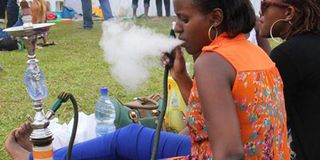Government defends law regulating tobacco consumption as civil society joins fight

A woman puffs shisha as she hangs out with a group of friends in Kampala recently. File photo
What you need to know:
- In its main petition before court, BAT contends that the Tobacco Control Act has the effect of unjustifiably singling out the tobacco industry for discriminative treatment and amounts to a ban on right to trade and consume a legal product, which contravenes the right to freedom from discrimination.
- Court is yet to fix a hearing date to hear the application to have the civil society organization be joined to the main petition.
KAMPALA. Government has defended the passing and operationalization of the law that restricts and regulates the consumption of tobacco and its products before the Constitutional Court.
Through the Attorney General, the government in its defence supporting the Tobacco Control law, states that the restriction of the use of tobacco in public places is proportionate given the harmful effects to health.
Equally, a civil society organization Centre for Health, Human Rights and Development, has also applied to court to join government in defending the Tobacco Control law on behalf of the general public.
The government’s response is in regard to the petition filed by the British American Tobacco (BAT) before the court, challenging a number of provisions of the Tobacco Control Act.
“The respondent (AG) shall contend that the economic consequences of tobacco use and exposure to tobacco smoke include an extraordinary economic burden on the government, individuals and societies,” reads in part the government’s defence
Adding: “This has led to among other consequences like health care costs for treatment borne by government, lost work days, disability and premature death.”.
The Tobacco Control Act prohibits smoking in public places like bars, cinemas, workplaces and means of transport.
The law came into force on November 28, 2015 after being put in the gazette.
The gazetting of this law followed a series of legislation including in 2012 when selected MPs drafted a Private Members’ Bill that culminated into the passing of the same Bill into law on July 28, 2015.
President Museveni went on to assent to it on September 19, 2015.
Following the passing of the law, police in a bid to enforce it, has occasionally raided bars and arrested a number of youths smoking shisha.
In further defending the law regulating tobacco use, the government states that the requirement to exhibit health messages that occupy no less than 65 per cent on the cigarette packet, is intended to communicate harmful effects of tobacco use to all including the illiterate and children.
The aforementioned defense is in regard to the provision of the Tobacco Control Act that demands that the graphic warning appearing on the unit packet, shall occupy no less than 65 per cent of the principal display area.
BAT on the contrary in its main petition, argues that the 65 per cent display unreasonably encumbers the use of its trade marks on the product packaging as protected under the Trademarks Act 2010 and also impacts on the goodwill associated with its brands.
In its main petition before court, BAT contends that the Tobacco Control Act has the effect of unjustifiably singling out the tobacco industry for discriminative treatment and amounts to a ban on right to trade and consume a legal product, which contravenes the right to freedom from discrimination.
BAT now wants the Constitutional Court to declare that section 15 (2) of the Tobacco Control Act contravenes articles 40 (2), 26 and 29 (1) a of the Constitution.
However, the court is yet to fix a hearing date to hear the application to have the civil society organization be joined to the main petition.



